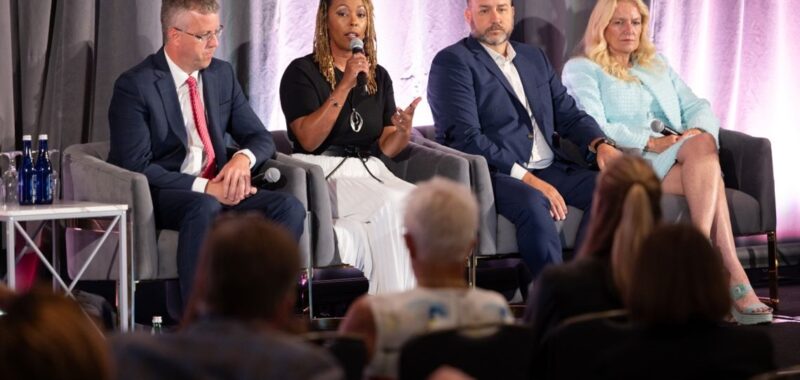Above: (left to right) Mike McDonagh, Kendall Bonner, Ed Zorn, Marilyn Wilson
WASHINGTON, D.C.—What happens when you get a bunch of lawyers and business operations experts in the room with hundreds of brokerage leaders to talk about one of the most pivotal legal cases the housing industry has seen in decades?
Well, let’s just say things can get interesting.
With a palpable undercurrent of tension, five legal and real estate brokerage experts took the stage Thursday at RISMedia’s CEO & Leadership Exchange for a panel discussion on how to avoid “legal landmines” in the aftermath of the landmark National Association of REALTORS® (NAR) settlement for $418 million. Alex Mihai, general counsel of Realty ONE Group, moderated the sometimes-contentious discussion.
 Kendall Bonner, VP of industry relations with the Kendall Bonner Team at eXp Realty, explained that brokerage leaders have to pivot and change their thinking (if they haven’t already) about commission sharing to safeguard their businesses.
Kendall Bonner, VP of industry relations with the Kendall Bonner Team at eXp Realty, explained that brokerage leaders have to pivot and change their thinking (if they haven’t already) about commission sharing to safeguard their businesses.
“There’s this temptation by agents, leaders and brokers to keep things the way they always were, and I think that’s part of the problem,” Bonner told attendees. “And why do I say that? It’s because commission sharing is the continuation of the unilateral offer of compensation, which is exactly what this lawsuit is about.
“With this change, we’ve now moved the buyer agent compensation from the seller side to the buyer side,” Bonner continued, adding, “and all it does when we say seller could pay direct or the seller can credit the buyer and the buyer can pay, is we’re just moving it from one side of the selling statement to the other.”
eXp notably removed broker-to-broker compensation from its listing agreements back in July, effectively ending commission sharing as a practice within the company (although sellers are still fully allowed to compensate buyer agents directly).
To further avoid legal landmines, Marilyn Wilson, managing partner with real estate consulting firm WAV Group, said brokerages need to take the lead in setting accountability with their agents.
For their part, agents should avoid “playing games” on (and off) the MLS with agent compensation offers. For instance, she’s heard about agents putting three apples on top of a microwave in MLS photos to indicate a 3% buyer agent commission or putting a $2.50 ending on the list price to indicate a 2.5% commission.
“Many MLSs have gone very strict on their instant penalty policy for good reason in trying to protect brokers from themselves—or their agents,” Wilson told brokerage leaders.
Creating ‘certainty,’ transparency on new buyer agreement forms
Back in May, Lamacchia Realty also decided to eliminate broker-to-broker compensation “to create certainty for our agents,” said Michael McDonagh, Lamacchia’s general counsel.
He added, “We have our own listing agreement. We have our own buyer contracts. We have options in our forms, and we think it’s the right balance between compliance with the settlement and allowing our sellers to have the best position to sell their home and keep their interests first.”
Lamacchia’s agreement is a two-page form that has the essentials without getting bogged down in legalese to ensure agents understand it and, in turn, so will their clients, McDonagh said.
“It’s plain language, and it’s easy to explain. That was the challenge…to get that right balance.”
Edward Zorn, VP and general counsel of the California Regional MLS, said the rule-change transition in California has been fairly seamless because California removed commission sharing from its forms. But that isn’t the case in all markets.
“I, personally, am a broker in Tennessee, and it’s a disaster,” Zorn said. “That form is still entirely based on commission sharing. There’s mass confusion in the marketplace.”
Zorn added that commission sharing comes with significant antitrust liability, adding to brokers’ risk.
Bonner said she believes agents are struggling to get buyer agreements signed because they themselves don’t understand them and can’t clearly articulate them. And because they don’t believe in them.
“As brokers and leaders, we have an obligation to get our agents to understand the value of this document for them and the customer,” Bonner said. “So once our agents get better at explaining it and understanding (it) themselves, and own and accept it, I think it’s not going to be a problem anymore.”
Overcoming objections and navigating disagreements
The panel shifted the discussion toward the attitude some agents have about how much they should receive in compensation if there’s a spread in the initial commission percentage and what the buyer brings to the table.
While some agents feel they should get that spread, that line of thinking is why the plaintiffs won the lawsuit against NAR, Zorn contended.
“If the seller had an anticipation to pay a certain amount, and a buyer agent comes along with a different amount, any spread, guys, belongs to the consumer—not us,” Zorn said. “You agree on the front end to a certain price for the value of your services.”
He continued, “You’ve done nothing else. Why should you get the spread and the difference simply because the seller was convinced to pay more? Once we shift that attitude, I think we’ll be better served.”
A broker in the audience asked the panel if there’s flexibility to adapt buyer agency agreements from the standardized forms to reflect unique situations, such as added bonuses. Bonner noted that, ultimately, it depends on whether the brokerage allows customization and whether the buyer agrees to it.
“Part of this whole challenge of the great temptation is what I’m calling the gap,” Bonner said. “The gap is, NAR and MLS exist here, and then over here is the finish line, and the gap (is) in the middle. Guess what? It’s us. We’re the brokers.
“We need to make policies. NAR, MLS and state associations cannot tell us how to run our business, so stop expecting it. And tell your agents to stop expecting it,” she told brokers.
Just as the panel wrapped up, Marco Rufo, a managing partner with The Agency in Pacific Palisades, California, spoke up from the crowd to express frustration that changes have been enacted by the industry before the settlement agreement is formally approved. (A federal judge will review the settlement agreement at a Nov. 26 scheduled court hearing.)

“The question no one’s asking is, that none of this is ratified,” Rufo interjected. “So the argument should be, what if these changes are going to be changed again? We’ve already been dealing with this for so many months.”
Some of the panelists tackled Rufo’s comments directly from the stage.
“We tell our folks from the get-go…the one thing you have to be prepared for is more change,” McDonagh said. “These are our forms, and we hope they stay the same. They might change.”
However, Rufo pushed back further to try and get a more direct answer from the panel. Bonner added that it doesn’t matter what the judge does because these are NAR’s rules.
“NAR has the power to continue along this line of policy-making because these are not the laws, at least not yet. These are just rules and policies that NAR has established for us, and we have agreed to abide by them. It has nothing to do with what the judge ultimately does. What the judge is ultimately going to approve is the dollar amount…and decide if we need to go further, most likely.”

